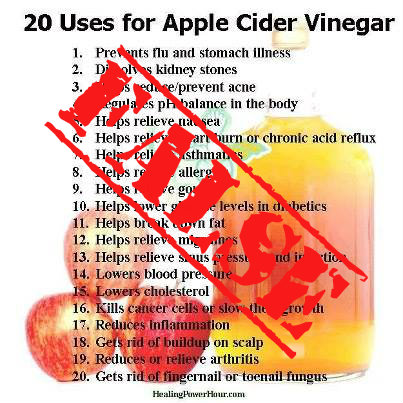 For years now, in person and via email, I’ve been fielding stupid questions about medicine/science from people who should know better.
For years now, in person and via email, I’ve been fielding stupid questions about medicine/science from people who should know better.
Just last week I went to an orthopedist (who shares office space with a plastic surgeon) for some pain in my thumb. The ‘medical assistant’ asked me what I did for a living (presumably ‘professional thumb wrestler’ might have hinted at the cause of my pain). When I said ‘scientist’ she asked what I did more specifically. I told her I was a researcher and studied cancer at a biotech company. At that point she started telling me about some of the patients they see for breast reconstruction and how she was convinced that the government and drug companies had the cure for cancer but were keeping it a secret. I replied, “How much money would you pay for the cure if you were dying of cancer? You don’t think they’d make more money if they sold the cure?” At which point she took her conspiracy theory to a whole new level I didn’t know existed. She said, “They are hiding it so INSURANCE companies can make money.”
At that point I realized what I was up against. She was a ‘medical assistant’ with ‘medical training’ and therefore had an informed opinion on this topic. Surely I was no match for her, what with my measly 15 years of cancer research and all. So, I just looked at her like the idiot she was, rolled my eyes and said, “Yeah. Right. OK.”
Who the heck does that!? You work in a doctor’s office you dolt! I just told you I’m a cancer researcher and you suggest I’m complicit in a high-reaching, broad-ranging, multi-national, corporate-government conspiracy to make money by hiding the truth? Really?
I wanted to walk out right then, but my thumb hurt and I had waited several weeks for the appointment.
______________________
With the ‘medical assistant’ (if that’s the kind of assistance she provides, I think I’m better off without it!), I didn’t have a relationship I wanted to salvage so I was fine with being blatant in my response to her lunacy. However, with friends and family members, I do (presumably) have a relationship I want to remain intact. So, when my cousin and uncle, at separate times, asked if it was true that companies were hiding the cure for cancer, I said something like,
Glad you’re asking. You’re right to question that conspiracy theory. It’s not true. If there were such a cure, it would be priceless. People would pay anything to cure themselves or their loved ones. How would hiding the cure make money? Regardless, there is no conspiracy. Cancer is incredibly complicated, there are thousands and thousands of researchers all over the world who have been working for decades and decades trying to figure out the causes and mechanisms, and we’re still a long way off. There is no cure. If there were, do you think I would let my aunts suffer and die from cancer? Do you think I would let my uncle suffer through another surgery? Do you think I would let my mother have lumpectomies and biopsies and live in fear that she too will get breast cancer? Do you think my colleagues would stand up to accept awards and tell the stories of people they love who died and inspired their work? Do you think we would watch children die? No, we wouldn’t. There is no cure, there is no conspiracy, cancer is just that hard to figure out.
I try not to be offended that by even asking, they imply I would do those things, that money could make me turn a blind eye to the suffering of the millions who die each year. I’m pretty sure the problem is that they aren’t thinking at all, that’s why they even entertain the conspiracy.
______________________
Now that Facebook exists and most poeple I know are on it, it’s cut down on ridiculous emails and face to face conversations. Instead people post crazy stuff and I have to decide whether to point out the fallacies or just ignore them. For instance:
A FB friend (who worked at daycare and was training to become a teacher and should know First Aid) posted this gem:
The caption with it was some BS story about a person putting egg whites on a burn and EMTs saying the person had saved the victim’s skin. Um. Has any Red Cross First Aid class EVER suggested this?! No. Because it’s not true!!! You run a burn under cool running water (or submerse it in cool water) for 10 to 15min. If it’s severe you call 911. While I sometimes let this kind of garbage slide, this woman should know better. I commented and left the links below on the photo. Plenty of her non-critical-thinking friends posted comments with their favorite home remedy- butter, etc. So, I gave up. (For a reliable source of first aid instructions, see the Mayo Clinic here or the American Red Cross here.)
Not long after this, she posted about aspartame being “Sweet Poison” and causing Multiple Sclerosis- and she tagged me asking if it were true (because that’s easier than just thinking about it and/or checking Snopes herself?). I linked to Snopes and called it a day (as I drank my aspartame riddled Fresca).
I’ve also seen this BS in my feed several times, including from a librarian who, you would think, would easily be able to find a source to verify the info included:

I added the “FALSE” but original Source: http://www.naturalcuresnotmedicine.com/2013/02/the-best-times-to-drink-water.html
Really?! What does ‘active internal organs’ even mean? Does my pancreas have an off switch I don’t know about?! How in heaven’s name are all these people dying of stroke and heart attack when all they have to do is drink water?! Note the web address of the source. Reminds me of the saying, “You know what they call natural cures that work? Medicine.”
This is another that is all over FB and I have to stop myself from commenting and being the know-it-all b!tch:

The “FALSE” is my embellishment, Source: https://www.facebook.com/natural.herb.benifits?filter=2
Cinnamon and Honey can do all that?! Why the hell am going to work everyday with all these scientists researching all these diseases?! Honey and cinnamon for everyone and we can all go home! And seriously, they cure the common cold?! I thought that was just some Shangri-La myth of Star Trek that we’d actually cure the common cold in some distant century. And again, let us take note of the source. I don’t trust medical info from people who can’t spell the word ‘benefits.’
Then, just last night, there was this one about Apple Cider Vinegar:
I commented on the photo when my friend shared it, “The only way cider vinegar prevents flu and stomach illness is if you use it to disinfect surfaces.” You can’t kill cancer cells in your body by drinking vinegar. It might make your hair shiny and kill fungus when you soak your finger nails in it, but you’re not going to dissolve your kidney stone so long as it’s still in your body.
So, I’m not sure. Do people just share randomly? Are they being ironic? Do they believe this stuff to be true? Should I make a note of who posts these things and send them a Ponzi Scheme chair letter in the mail? How do you deal with this lack of critical thinking without alienating the people you know?
______________________
How do I deal with it? Well, if they are asking me if something is true I say something like, “You’re right to be skeptical.” Even if it’s clear they believe it and are kind of throwing it up there like, “Oh yeah! Well explain this one know-it-all! Let’s see how you handle this one!” I try to let them save face by pretending they ARE thinking critically and questioning the content they are sharing.
One friend recently posted a link to an article entitled, “Merck vaccine developer admits vaccines routinely contain hidden cancer viruses derived from diseased monkeys” on my Wall with the comment, “Umm. Why?”
Clearly her asking ‘why’ implied she believed that it was true (which it is not), like, “Why are vaccine developers doing this?” Rather than point out how gullible she was for believing something on Underground Health, I started my response with, “You are right to be questioning this, and I’m glad you’ve asked. It’s bogus.” I then summarized that they are talking about polio vaccine in the 50s and 60s (not current vaccines), it was a virus that was in the monkey cells used to make the vaccine, once the virus was discovered/identified steps were taken to get rid of it, the virus doesn’t cause cancer in humans and nobody who got the contaminated vaccine developed cancer as a result, and I referred her to this great take down of that misleading BS.
She never commented on my response. I’m sure it’s embarrassing to personally put your own gullibility on display, even if the person who responds is gracious.
______________________
So, in closing, I’d like to leave you with a few links that can help you distinguish the bunk from the facts.
“Be Careful Who You Ask” in which I discuss sources of parenting information.
“Real Science vs. Fake Science: How can you tell them apart?” where Emily Willingham gives pointers on how to tell the difference.
“Distinguishing Science from Pseudoscience” where Rory Coker, PhD discusses the difference between the two. This might be particularly helpful when it comes to those FB images, since many of them start with a tiny grain of truth (ie vinegar can kill cancer cells in a petri dish), and then take it to the realm of pseudoscience (ie drinking vinegar will cure cancer).
______________________
10 ways to spot what NOT to share on Facebook
1. An image with text on it that has no citations or attributions so you can’t track down the source.
2. You Google a snippet of the text and the first hit is Snopes.
3. It sounds too good to be true, i.e. the stuff in your pantry will cure anything that might be wrong with you.
4. You’d be embarrassed to tell your doctor you tried it based on a Facebook post.
5. It implies that any/all scientists, doctors, medical professionals are complicit in a high-reaching, broad-ranging, multi-national, corporate-government conspiracy to make money by hiding the truth.
6. The source is Age of Autism, Natural News, Underground Health, etc.
7. It’s an advertisement for some money-making scheme (diet solution, natural remedies website, etc).
8. It contains spelling errors.
9. You ask yourself, “That can’t possibly be true, can it?”
10. It includes the admonition to “Share if you care,” “MUST Share,” or otherwise encourages you to spread the word.





